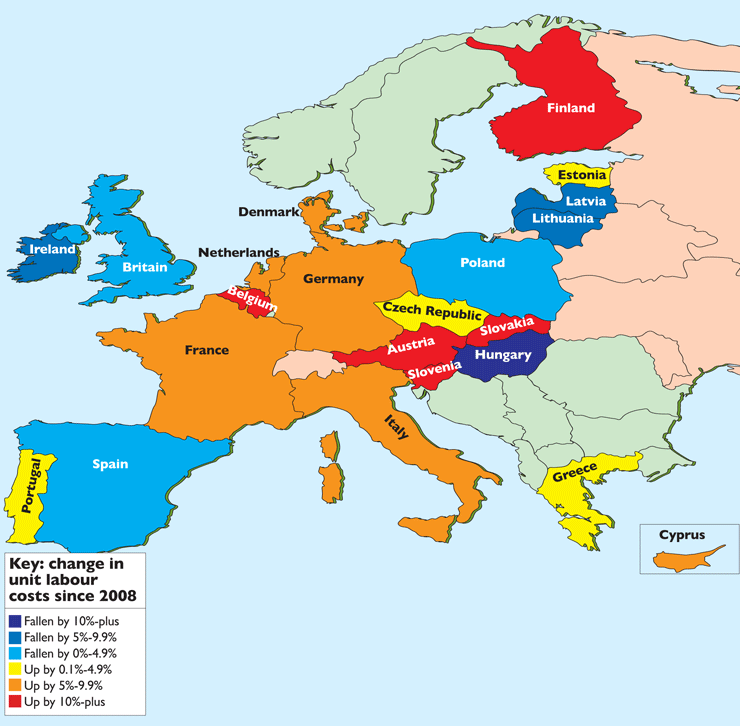Get the latest financial news, insights and expert analysis from our award-winning MoneyWeek team, to help you understand what really matters when it comes to your finances.
You are now subscribed
Your newsletter sign-up was successful
Want to add more newsletters?

Twice daily
MoneyWeek
Get the latest financial news, insights and expert analysis from our award-winning MoneyWeek team, to help you understand what really matters when it comes to your finances.

Four times a week
Look After My Bills
Sign up to our free money-saving newsletter, filled with the latest news and expert advice to help you find the best tips and deals for managing your bills. Start saving today!

One of the key issues facing the eurozone is that the peripheral' economies are so much less competitive than the likes of Germany. Pre-single currency days, countries such as Greece could rely on a falling drachma to cut their labour costs relative to the deutschemark. Now they have to do it the hard way, by actively cutting wages or becoming more productive, or both.
So a report on labour costs, just out from the Conference Board, seems to contain some good news. Economists Bert Colijn and Bart van Ark looked at costs in Europe from the first quarter of 2008 to the last quarter of 2011. As the map above shows, some European economies, including Ireland and the Baltic states, have seen their labour costs decrease in that time, making their exports far more competitive. Indeed, Latvian labour costs (Latvia pegs its currency to the euro) have fallen by more than 5%.
Even in Greece, where the overall price of labour went up over this period, costs have started to fall in the past two years. Colijn and van Ark argue that this proves that labour market flexibility is more important than control of a national currency.
MoneyWeek
Subscribe to MoneyWeek today and get your first six magazine issues absolutely FREE

Sign up to Money Morning
Don't miss the latest investment and personal finances news, market analysis, plus money-saving tips with our free twice-daily newsletter
Don't miss the latest investment and personal finances news, market analysis, plus money-saving tips with our free twice-daily newsletter
Indeed, if the strictures of euro membership actively encourage economic reforms that boost productivity, they argue it will have long-term benefits. Leaving the euro, on the other hand, "would only result in a brief increase in competitiveness that would later evaporate".
However, their conclusions come with a number of caveats. They accept that labour costs have not adjusted quickly enough to prevent a substantial fall in employment, and that the austerity measures designed to keep the euro together have resulted in output falling. This means that if countries remain in the euro, without carrying out economic reforms (what they call "muddling through"), then they are likely to experience the worst of both worlds: a short-term slump without a long-term boost.
Get the latest financial news, insights and expert analysis from our award-winning MoneyWeek team, to help you understand what really matters when it comes to your finances.
MoneyWeek is written by a team of experienced and award-winning journalists, plus expert columnists. As well as daily digital news and features, MoneyWeek also publishes a weekly magazine, covering investing and personal finance. From share tips, pensions, gold to practical investment tips - we provide a round-up to help you make money and keep it.
-
 Should you buy an active ETF?
Should you buy an active ETF?ETFs are often mischaracterised as passive products, but they can be a convenient way to add active management to your portfolio
-
 Power up your pension before 5 April – easy ways to save before the tax year end
Power up your pension before 5 April – easy ways to save before the tax year endWith the end of the tax year looming, pension savers currently have a window to review and maximise what’s going into their retirement funds – we look at how

